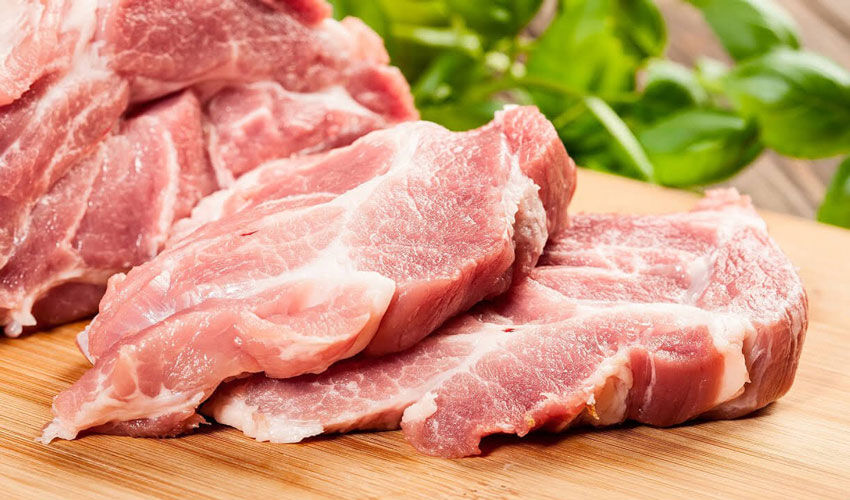
At its last session, the Parliament dared to make a “grand gesture” – it adopted amendments to the Tax Code and other normative acts, which will allow the operators of the meat market of Moldova to import 1.2 thousand tons of frozen pork (tariff items 020322 and 020329) without paying customs duty until October 31, 2025. We can say that the outgoing deputy corps gave “earrings to each of the sisters” – and helped the processors a little, and did not offend pig farmers much. However, no one of the beneficiaries was particularly happy about this, according to the general impression, “electoral gift”. But they took advantage of it.
Importers have already selected almost the entire volume of duty-free frozen pork. By the end of the current week a little more than 300 tons remained. A sip to quench the summer thirst has been drunk. The last barrier to keep pork prices from spiraling out of control before the elections has been successfully overcome.
The decision to exempt the above-mentioned volume of imported frozen pork from duty was literally a tortured one. At first, the heads of the Ministry of Agriculture and Food Industry MAIA and the National Food Safety Agency ANSA claimed that everything was under control. In the sense that the forced slaughter in March this year of 120 thousand pigs diseased with African swine fever (which is “only” one third of the number of industrial pig farms in Moldova) will not affect the filling of the Moldovan pork market. And there are no grounds for the increase of prices for this raw material and products from it at all.
But the prices for pork for industrial processing and, along the chain, for sausage and other meat products were growing. The Association of Patronage of Meat Processing Industries (PÎIPC) regularly informed the Moldovan authorities and the general public about it.
In response to the rise in pork prices, the authorized agencies conducted raids on retail outlets to detect cartelization and other infringements of competition. MAIA and ANSA continued to assure consumers that there was no shortage of pork, as it was preventively compensated for by the import of live pigs for slaughter (duty-free under the agreement with the EU).
This is the unvarnished truth. Because even before the mass slaughter of pigs due to ASF , Moldovan pig breeding was substantially dependent on imports of European piglets for growing and subsequent slaughter. This branch of Moldovan animal husbandry was not self-sufficient before. That is, in a different form, but there was a deficit (at least of young animals and breeding stock) before. Due to ASF, the shortage of industrial pork has become obvious and visible to everyone (except for the industry ministry, of course).
In the period from March to June 2025, according to ANSA, Moldova received more than 5 thousand pigs. These deliveries were risky. Since the transit routes passed through the EU countries, which periodically found themselves in the “red zone” of epizootic danger, in particular, due to the detection of cases of ASF and foot-and-mouth disease in animals.
As a result, the Moldovan authorities finally agreed to exempt safer imports of frozen pork from the EU from duties. The reasons for such a decision, stated by the developers of the relevant draft law, sounded strange to the layman’s ear: in the summer heat it is not humane to transport live pigs for a long time in livestock trucks, and the demand for pork during summer vacations has increased. It is not appropriate to object to the humane treatment of farm animals prior to slaughter. The Republic of Moldova has signed the relevant international regulations. On the contrary, the demand for pork in the country in summer is in seasonal decline.
But, perhaps, this is not even the point. Many experts agreed that requesting the European Commission to increase quotas for duty-free fruit supplies in the future, the Moldovan authorities should have offered something in return. For example, an increase in duty-free quotas for meat imports from the EU. In the context of this version, the “generous gift to the meat market” in the form of 1.2 thousand tons of frozen pork until 31.10.25 is a “rehearsal”, a goodwill gesture towards the European partners in the dialogue on the DCFTA actualization.
By the way, recently the Internet resources of the European Commission and the Moldovan government published information that the parties have actualized the DCFTA agreement. In particular, the previous quota for duty-free import of pork (5.5 thousand tons) was increased by 1 thousand tons of frozen pork. The decision will enter into force after ratification, which, according to official reports, “will be carried out as soon as possible”.
Be that as it may, the deed can be said to have been done. What will happen next with the filling of the meat market and the prices of meat products? A word to the market operators.
Sergey Gradinaru, co-owner of Nivallii: “We, meat processors and producers of meat products, do not understand the logic behind the actions of the subjects of framework decisions regarding the pork market. Why only 1.2 thousand tons of frozen pork imported to Moldova were exempted from customs duties?
According to the calculations of the PÎIPCpatron , in more or less optimistic scenarios of the evolution of the state of affairs in Moldovan pork production, the meat market of Moldova lost 9-12 thousand tons of pork (in “carcasses”, half carcasses) in the annual perspective. Representatives of the patronage in the dialog with the authorities of the Republic of Moldova convincingly argued the need to exempt from duty all imported pork for industrial processing for the period until the Moldovan pork industry restores the production cycle after the losses of livestock due to ASF. Struggling with the uncompromising position of the MAIA Ministry of Agriculture and Food Industry , the patronage moderated the request to a critically necessary level – exemption from customs duty on imports to Moldova at least 3-4 thousand tons of frozen parts of pork carcasses. But even this we did not receive.
From our point of view, the Ministry of Agriculture at all stages of the “meat crisis” clearly supported only pig producers, ignoring the interests of meat processors. Accordingly, the extremely limited volume of duty-free imports of frozen pork is what the key players in the pork industry agreed to under the pressure of the negative evolution of events on the meat market. At the same time, no one wants to take into account the fact that meat processors and producers of meat products are a significant share of consumers of pork producers’ products. Moreover, they are stable and solvent. For the pork sector, losing a solid part of our customer base is a reckless and irrational move. After all, at least some processors will decide to invest in the development of their own raw material base. I am sure that working for the end consumer, sausage producers will have more resources to build a better livestock business than “pure” pig farms. Which, by the way, have twice already failed to manage the risks associated with ASF.
We are convinced that the main share of added value, taxes, highly qualified and highly paid jobs is generated by the processing sector and the production of finished products. The satisfaction of Moldovan consumers and, in the long term, the export potential of the Moldovan agri-food sector depends to a decisive degree on the well-being of food enterprises. Therefore, we very much hope that the Moldovan authorities will continue the dialog with the European Commission on further improvement of the DCFTAagreement in terms of quota expansion”.
Anatoliy Tritiac, Director of MMD Group: “Operators of the meat market of Moldova are well aware of the standard market dynamics: when annual Euro quotas for preferential import of meat expire, prices for meat raw materials increase significantly. The crisis with the slaughter of a significant part of the livestock of industrial farms due to ASF has only accelerated and intensified this dependence. According to very rough estimates, local pig farmers have earned at least an additional euro per kilogram of p ork thanks to the price increase.
Of course, it is good that meat market operators had the opportunity to import at least 1.2 thousand tons of frozen pork at this point in the season. But it was quite rightly written in an article published in Logos Press that the first and to the greatest extent this modest opportunity will be used by those meat market operators who have the money for a single large purchase of goods. Many trading companies operating on small margins do not have the resources to do so and are not willing to take the risk.
In principle, additional “emergency” quotas will not save the Moldovan meat market from constant deformation, threats of shortages and price increases. Systemic liberalization of the market is necessary. Ultimately, the market should work for the consumer, he is the main one. He decides in what quantity, at what price and from whom to buy goods. To impose or restrict is not a grateful and even dangerous business”.
Rodion Melnyk, Director of Carmez International: “We managed to purchase a substantial part of frozen pork within the “emergency quota”. This action required a great financial strain from the company. But we were forced to take this step for the sake of preserving the production rhythm, jobs and customers.
Unfortunately, the problem of stable supply of raw materials to the enterprises of meat processing industry has not gone away. Alas, our partners – local pig-breeding companies – have just begun work on disinfection and preparation of farms for the reception of young stock. It will take them a long time, possibly years, to restore stable pork production in the volumes we need. Taking this into account, we will have to continue the dialog with the authorities of the Republic of Moldova on the possibility of preferential import of pork in the short term. The fact that the “emergency” quota for frozen pork was chosen in less than a month shows that the solution to the problem is still ahead”.

